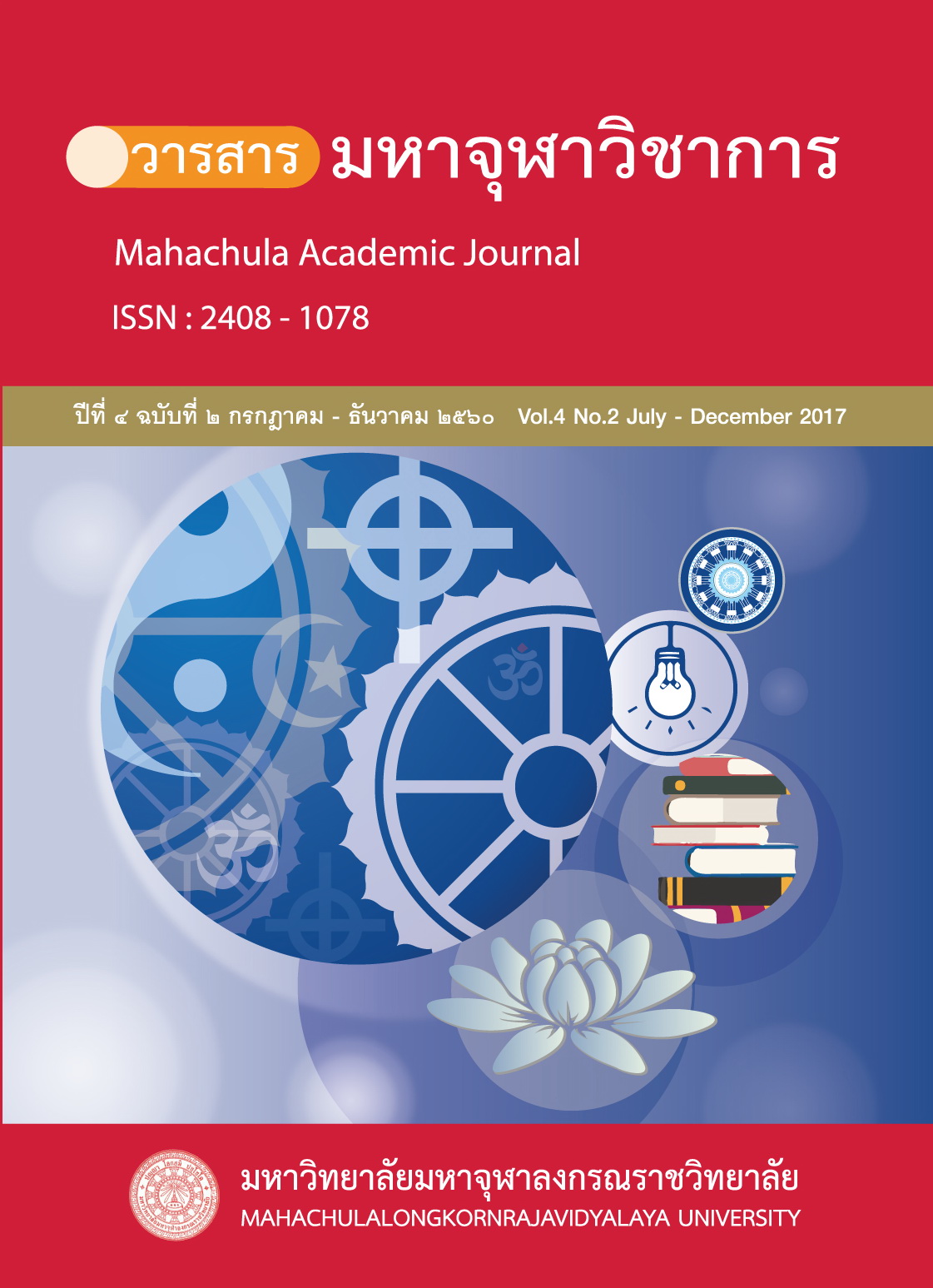Reflection on Coexist Principles based on E-san Customary Laws: a Case study of Ancient Law of Saket Nakorn and the Dao-Wa-Dueng
Main Article Content
Abstract
The purposes of this study were to: 1) study the Coexist Principles of the Ancient Laws of Saket Nakorn and the Dao-Wa-Dueng versions, 2) reflect on the principles of living as collective members in society related to the ancient laws of Saket Nakorn and the Dao-Wa-Dueng Issues. The researchers employed qualitative research approach for data collection. The document analysis and in-depth interview with six experts were conducted. The descriptive analysis and narrative report were implemented. It was found that in the past, E-san society was governed based on Buddhist principles. The law was always enacted for people to believe in and pay homage to Buddhist as highly aspect in their lives. This approach was considered to be the govern approach of local administration even though during such period, there were quite a number of laws, but it was not well-categorized into chapters. It showed the simple way of life in the society with no complication. The content of laws were specified only the crucial ones such as the aspect of enriching Buddhism, pay respect to the govern class, aspect of adultery, trample on animals and crops, brawl, robbery, and debt. All these aspects were concerned with five Buddhist precepts. Moreover, ancient E-san society was not only stipulated law to control the society, E-san people were also based their ways of life on participating in activities of merit making all year round as well as held on the practice of “Heed Sip-Song Klong Sip-See” (14 principles) as the main principle for govern the country. The general public was also based their practices on the fourteen principles which was reflected on the situation of collective rules for the society in that era.
Article Details
References
กฎหมายโบราณ ฉบับวัดดาวดึงส์ อำเภอแกดำ จังหวัดมหาสารคาม. ไม่ระบุสำนักพิมพ์, ๒๕๔๘.
กฎหมายโบราณสาเกตุนคร ฉบับวัดพรหมประสิทธิ์ อำเภอกันทรวิชัย จังหวัดมหาสารคาม. ม.ป.พ. ๒๕๔๘.
จารุบุตร เรืองสุวรรณ. ขนบธรรมเนียมประเพณีระบอบการปกครองของชาวอีสานสมัยเก่า. มหาสารคาม: เอกสารสัมมนาประวัติศาสตร์อีสาน มหาวิทยาลัยศรีนครินทร์วิโรฒ, ๒๕๒๑.
สาร สาระทัศนานันท์. หนังสือชุดสมบัติอีสาน. เลย: รุ่งแสงการพิมพ์, ๒๕๒๔.
สุวิทย์ ธีรศาสวัติ และดารารัตน์ เมตตาริกานนท์. ประวัติศาสตร์อีสานหลังสงครามโลกครั้งที่สองถึงปัจจุบัน. ขอนแก่น: คณะมนุษยศาสตร์และสังคมศาสตร์ มหาวิทยาลัยขอนแก่น, ๒๕๔๑.
อรรถ นันทจักร. เอกสารปริวรรตกฎหมายภาคอีสานจากกฎหมายประเภทใบลาน. อำนาจเจริญ: ศูนย์วัฒนธรรมอีสาน โรงเรียนอำนาจเจริญ, ม.ป.ป..
อรรถ นันทจักร์. ประวัติศาสตร์นิพนธ์อีสาน : การศึกษาเชิงวิเคราะห์ ประเพณีการจดบันทึกประวัติศาสตร์หัวเมืองอีสานถึงต้นคริสต์ศตวรรษที่ ๒o. กรุงเทพมหานคร: มหาวิทยาลัยศิลปากร, ๒๕๒๙.
ผสัมภาษณ์
สัมภาษณ์ ปฐมพงศ์ ณ จัมปาศักดิ์. ผู้ช่วยอธิการบดีฝ่ายกิจการพิเศษ มหาวิทยาลัยมหาสารคาม, ๑๒ เมษายน ๒๕๕๘.
สัมภาษณ์ สมัย วรรณอุดร. อาจารย์ประจำภาควิชาภาษาไทยและภาษาตะวันออก คณะมนุษยศาสตร์และสังคมศาสตร์ มหาวิทยาลัยมหาสารคาม, ๑ พฤษภาคม ๒๕๕๘.
สัมภาษณ์ สัญญา วุฒิสาร. ครูประจำโรงเรียนบรบือวิทยาคาร มหาสารคาม, ๙ สิงหาคม ๒๕๕๘.
สัมภาษณ์ อธิราช นันขันตี. อาจารย์ประจำสาขาการศึกษาปฐมวัย คณะศิลปศาสตร์และวิทยาศาสตร์มหาวิทยาลัยนครพนม, ๒ กุมภาพันธ์ ๒๕๕๘.
สัมภาษณ์ อรรถ นันทจักร. ศาสตราจารย์เกียรติคุณ อดีตอาจารย์ประจำภาควิชาประวัติศาสตร์ คณะมนุษยศาสตร์และสังคมศาสตร์ มหาวิทยาลัยมหาสารคาม, ๘ ตุลาคม พ.ศ. ๒๕๕๘.


